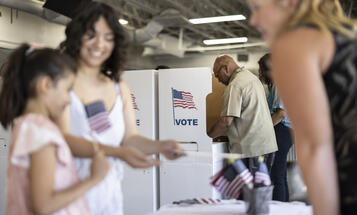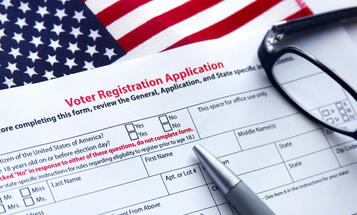
“Show Me Your Papers” Bills Like the SAVE Act Are Gaining Popularity—And Would Disenfranchise Millions
These proof of citizenship bills capitalize on anti-immigrant sentiment and perpetuate outright lies to justify restrictive practices that will make it harder for everyone to vote.

The SAVE Act is not the first of its kind, but it has unfortunately captured the imagination of lawmakers around the country.
A few weeks ago, the House of Representatives passed a sweeping voter suppression bill deceptively named the “Safeguard American Voter Eligibility (SAVE) Act,”1 which is now on its way to the Senate. The SAVE Act would require all voters to show documentary proof of citizenship in person each time they register or re-register to vote. What makes the SAVE Act so pernicious is that it masquerades as a bill that is merely intended to make sure only U.S. citizens participate in federal elections. In truth, it capitalizes on growing anti-immigrant attitudes among the American public2 and perpetuates lies about the prevalence of noncitizen voting to justify disenfranchising millions of eligible voters while disproportionately harming low-income voters, Black and brown voters, naturalized citizen voters, and married women voters, among other groups.3 The SAVE Act is not the first of its kind, but it has unfortunately captured the imagination of lawmakers around the country.
Proof of citizenship laws are gaining momentum at the state level.
According to the Voting Rights Lab, 25 states have introduced 53 bills requiring proof of citizenship during the 2025 legislative session so far.
While the SAVE Act faces an uphill battle in the Senate4 it is not a new or isolated effort to impose a “show me your papers” requirement to vote. Comparable laws requiring proof of citizenship in local and state elections have also been gaining momentum at the state level. A few states began paving the way for proof of citizenship laws years ago. Georgia, for instance, has required certain voters to present proof of citizenship at the polls since 2017.5 And in Arizona, increasingly severe proof-of-citizenship requirements—which have been the subject of intense legal battles—date back to 2004.6 The Arizona legislature initially tried to require that everyone who registered to vote show proof of citizenship, but in 2013 the Supreme Court found that that requirement violated the National Voting Rights Act for federal elections.7 As a result, Arizona currently has a bifurcated voter registration system: Those who use the state’s registration form and provide proof of citizenship can vote on local, state, and federal matters, while those who opt for the federal form, which does not require them to show proof of citizenship, can vote only on federal matters.8 A federal appeals court also recently struck down portions of two more expansive proof-of-citizenship laws enacted in Arizona in 2022.9 In fact, most of the enacted "show me your papers” laws are being challenged by voting rights groups or are tied up in litigation.10
Over the past year, “show me your papers” election laws have passed in New Hampshire,11 Louisiana,12 Indiana,13 and Wyoming,14 and many more states may follow suit. According to the Voting Rights Lab, 25 states have introduced 53 bills requiring proof of citizenship during the 2025 legislative session so far.15 In Texas, for example, a proof of citizenship law recently passed the state Senate and is now headed to the Texas House of Representatives16—several aspects of this bill mirror those that have not survived legal challenges in Arizona.17
Like the SAVE Act, most of these “show me your papers” state laws that have recently been introduced or enacted require voters to show documents proving their citizenship when registering to vote.18 A few state laws, such as those enacted in Indiana and Georgia,19 operate more narrowly, though they still risk disenfranchising eligible voters. The Indiana and Georgia laws require election officials to cross-check the citizenship status of voter registration applicants using Department of Motor Vehicle records, which are known to be unreliable for purposes of determining citizenship status.20 Voters who are flagged under this faulty methodology are then forced to come forward with documentary proof of their citizenship to avoid having their registrations canceled. A few of the bills, such as the one making progress in Texas,21 also mirror the SAVE Act in that they impose fines or criminal penalties on election administrators for failure to follow the proof-of-citizenship requirements.22
Lawmakers pushing for these bills are no doubt emboldened by the progress of the SAVE Act. President Trump also recently issued an executive order in March which attempts to bypass the legislative process and accomplish much of what the SAVE Act would do, among other things.23 While this order has already been challenged in court as lacking legal authority,24 its potential to confuse and further entrench false ideas about the need for proof of citizenship in elections is high.
Proof-of-citizenship laws serve no legitimate purpose.
As many have noted, documentary proof-of-citizenship laws are a “solution in search of a problem.”25 Proponents have falsely promoted proof-of-citizenship laws as necessary measures to ensure that only citizens participate in elections. But federal laws already limit voting to citizens26 and impose effective measures to verify citizenship, including a requirement that voter registration applicants swear under penalty of perjury that they are citizens.27 Moreover, lies about widespread noncitizen voting have been repeatedly debunked.28
Proof-of-citizenship laws harm all voters, including those who already face structural barriers to political participation.
Since most state driver’s licenses do not indicate U.S. citizenship, a valid passport or birth certificate that matches an applicant’s current legal name are usually the only available documents that would satisfy the SAVE Act’s proof of citizenship requirement.
Mandating documentary proof of citizenship in elections nationwide—as the SAVE Act proposes to do—would disenfranchise millions of eligible voters. Over 21 million American citizens don’t have documents proving their citizenship readily available, and at least 3.8 million don’t have access to the requisite documents at all—mostly because they were lost, destroyed, or stolen.29 Since most state driver’s licenses do not indicate U.S. citizenship,30 a valid passport or birth certificate that matches an applicant’s current legal name are usually the only available documents that would satisfy the SAVE Act’s proof of citizenship requirement. But obtaining these documents is costly, complicated, and time consuming. Approximately 146 million American citizens—about half of all eligible voters—do not currently have a valid passport.31 More troublingly, passport ownership is even lower among voters who already face structural barriers to political participation, including people of color, low-income voters, and voters with less formal education.32 For example, “while just over [eight] percent of self-identified white American citizens don’t have citizenship documents readily available, that number is nearly 11 percent among Americans of color.”33
The alternative of providing a birth certificate to prove citizenship includes its own logistical and administrative barriers, which are insurmountable for some. For naturalized citizens, it is not an option at all. For those who were born in the U.S., requesting a birth certificate is a time-consuming process, especially for those who do not live in the state where they were born. Even among those who can easily access their birth certificate, millions may not be able to use it to prove citizenship due to a name change. Up to 69 million women and four million men have changed their last name after marriage and therefore don’t have a birth certificate that would satisfy the SAVE Act.34 And any of the 3.3 million trans citizens who have changed their legal name would also lack an acceptable birth certificate for purposes of the Act—which is particularly problematic considering the additional hurdles that trans people face in getting a passport that accurately reflects their chosen name and gender.35
The SAVE Act’s proof-of-citizenship requirement would also disenfranchise voters in another major way—by upending popular methods of voter registration like registration by mail, online voter registration, automatic registration, and third-party voter registration efforts such as community registration drives.36 Gutting third-party voter registration in particular would disproportionately harm voters of color, who are historically nearly twice as likely to register to vote through a community registration drive as compared to white voters.37 Census Bureau survey data from the 2022 election cycle also tells us that younger voters, voters with less formal education, low-income voters, and voters who are naturalized citizens all rely on third-party registration efforts at higher rates.38
Proof of citizenship laws are undemocratic.
What “show me your papers” laws will ultimately do is cut more people out of our democracy. The failure of the Kansas proof-of-citizenship law should serve as a cautionary tale. When Kansas tried to implement a documentary proof-of-citizenship law in 2011, it “ended up blocking the voter registrations of more than 31,000 U.S. citizens who were otherwise eligible to vote. That was 12% of everyone seeking to register in Kansas for the first time.”39 In 2020, a federal appeals court ruled that the Kansas law violated the National Voting Rights Act.40
For each ill-advised proof-of-citizenship bill that surfaces, the stakes are incredibly high. These laws will keep millions from the ballot box.
For each ill-advised proof-of-citizenship bill that surfaces, the stakes are incredibly high. These laws will keep millions from the ballot box. They will ensure that groups that have been historically disenfranchised will face more hurdles in registering to vote. They will put additional pressure on hardworking and under-resourced election officials who are just trying to do their jobs. They will sow more chaos and uncertainty for the upcoming election cycle as each bill makes its way through the courts. These bills must be recognized for what they are—voter suppression—and be discredited nationwide once and for all.
- 1119th Congress H.R. 22 (2025).
- 2Jeffrey M. Jones, Sharply More Americans Want to Curb Immigration to U.S., Gallup (July 12, 2024), https://news.gallup.com/poll/647123/sharply-americans-curb-immigration.aspx?utm_source=alert&utm_medium=email&utm_content=morelink&utm_campaign=syndication.
- 3, e.g., Neda Khoshkhoo and Angelo Ancheta, The SAVE Act’s Threat to Community-Based Voter Registration Drives, Dēmos (March 13, 2025), https://www.demos.org/research/save-acts-threat-community-based-voter-registration-drives.
- 4Jacon Knutson, SAVE Act: House Passes GOP Voting Bill That Could Disenfranchise Millions, Democracy Docket (April 10, 2025), https://www.democracydocket.com/news-alerts/house-passes-save-act-voter-suppression-law/.
- 5Georgia H.B. 268 (2017). This requirement is distinct from Georgia’s Voter Identification requirements. See "Georgia Voter Identification Requirements,” Georgia Secretary of State, https://sos.ga.gov/page/georgia-voter-identification-requirements.
- 6Caitlin Sievers, Appeals court blocks Arizona laws targeting “federal only” voters, Arizona Mirror (February 25, 2025), https://azmirror.com/2025/02/25/appeals-court-blocks-arizona-laws-targeting-federal-only-voters/
- 7Arizona v. Inter Tribal Council of Arizona, Inc., 570 U.S. 1 (2013).
- 8Caitlin Sievers, Appeals court blocks Arizona laws targeting “federal only” voters, Arizona Mirror (February 25, 2025), https://azmirror.com/2025/02/25/appeals-court-blocks-arizona-laws-targeting-federal-only-voters/.
- 9Ibid. (The federal appeals court also instructed the lower court to revisit the issue of whether the laws were passed with discriminatory intent.)
- 10A youth voting group recently sued to block the New Hampshire law from taking effect. Courtney Cohn, Youth Voting Group Sues to Block New Hampshire’s Proof of Citizenship Law, Democracy Docket (September 17, 2024), https://www.democracydocket.com/news-alerts/youth-voting-group-sues-to-block-new-hampshires-proof-of-citizenship-law/; The Arizona and Georgia proof-of-citizenship laws are making their way through the federal courts. Caitlin Sievers, Appeals court blocks Arizona laws targeting “federal only” voters, Arizona Mirror (February 25, 2025), https://azmirror.com/2025/02/25/appeals-court-blocks-arizona-laws-targeting-federal-only-voters/; Madeleine Greenberg, Judge Dismisses Challenge to Georgia’s Voter Citizenship Verification Requirements, Democracy Docket (April 11, 2024), https://www.democracydocket.com/news-alerts/judge-dismisses-challenge-to-georgias-voter-citizenship-verification-requirements/; National and state voting rights groups have also notified the Louisiana and Indiana secretaries of state that their respective bills violate the National Voting Rights Act. Louisiana Law Violates National Voter Registration Act, Imposes Unnecessary Burdens on Eligible Voters, Legal Defense Fund (January 28, 2025), https://www.naacpldf.org/press-release/louisiana-law-violates-nvra-imposes-unnecessary-burdens-on-eligible-voters/; Lauren Chapman, "Voting rights groups coalition challenges citizenship crosscheck law, set to take effect July 1,” Indiana Public Radio (April 3, 2025), https://indianapublicradio.org/news/2025/04/voting-rights-groups-coalition-challenges-citizenship-crosscheck-law-set-to-take-effect-july-1/; National and state voting rights groups have also notified the Louisiana and Indiana secretaries of state that their respective bills violate the National Voting Rights Act. Louisiana Law Violates National Voter Registration Act, Imposes Unnecessary Burdens on Eligible Voters, Legal Defense Fund (January 28, 2025), https://www.naacpldf.org/press-release/louisiana-law-violates-nvra-imposes-unnecessary-burdens-on-eligible-voters/; Lauren Chapman, Voting rights groups coalition challenges citizenship crosscheck law, set to take effect July 1, Indiana Public Radio (April 3, 2025), https://indianapublicradio.org/news/2025/04/voting-rights-groups-coalition-challenges-citizenship-crosscheck-law-set-to-take-effect-july-1/.
- 11New Hampshire H.B. 1569 (2024).
- 12Louisiana S.B. 436 (2024).
- 13Indiana H.B. 1264 (2024).
- 14Wyoming H.B. 156 (2025).
- 15Proof of Citizenship, Voting Rights Lab, https://tracker.votingrightslab.org/pending/search/issue/proof-of-citizenship.
- 16Texas S.B.16 (2025).
- 17Natalia Contreras, Bill requiring voters to show proof of citizenship clears Texas Senate, The Texas Tribune (April 1, 2025), https://www.texastribune.org/2025/04/01/texas-proof-of-citizenship-voting-senate-bill-16/.
- 18Proof of Citizenship, Voting Rights Lab, https://tracker.votingrightslab.org/pending/search/issue/proof-of-citizenship.
- 19Indiana H.B. 1264 (2024); Georgia H.B. 268 (2017).
- 20Protecting Voter Registration: An Assessment of Voter Purge Policies in Ten States, Dēmos (August 2023), https://www.demos.org/sites/default/files/2023-11/Protecting%20Voter%20Registration%20-%20Full%20report.pdf.
- 21Texas S.B.16 (2025).
- 22See also Oklahoma S.B. 659 (2025).
- 23Preserving and Protecting the Integrity of American Elections, The White House (March 25, 2025), https://www.whitehouse.gov/presidential-actions/2025/03/preserving-and-protecting-the-integrity-of-american-elections/.
- 24Voting Rights Groups Challenge Trump’s Recent Executive Order, ACLU (April 1, 2025), https://www.aclu.org/press-releases/voting-rights-groups-challenge-trumps-recent-executive-order.
- 25See, e.g., Elfreth Votes No on the SAVE Act, Congresswoman Sarah Elfreth, (April 10, 2025), https://elfreth.house.gov/media/press-releases/elfreth-votes-no-save-act.
- 2618 U.S.C. § 1015.
- 27National Voting Rights Act of 1993, 52 U.S.C. § 20504; 52 U.S.C. § 20508.
- 28Allison Anderman, Debunking Lies About Voting and Citizenship, Brennan Center for Justice (October 10, 2024), https://www.brennancenter.org/our-work/analysis-opinion/debunking-lies-about-voting-and-citizenship.
- 29Kevin Morris and Cora Henry, Millions of Americans Don’t Have Documents Proving Their Citizenship Readily Available, Brennan Center for Justice (June 11, 2024), https://www.brennancenter.org/our-work/analysis-opinion/millions-americans-dont-have-documents-proving-their-citizenship-readily.
- 30Enhanced Drivers Licenses: What Are They?, Department of Homeland Security, https://www.dhs.gov/enhanced-drivers-licenses-what-are-they (last updated April 27, 2023).
- 31Greta Bedekovics and Sydney Bryant, The SAVE Act Would Disenfranchise Millions of Citizens, Center for American Progress (January 31, 2025), https://www.americanprogress.org/article/the-save-act-would-disenfranchise-millions-of-citizens/.
- 32Kevin Morris and Cora Henry, Millions of Americans Don’t Have Documents Proving Their Citizenship Readily Available, Brennan Center for Justice (June 11, 2024), https://www.brennancenter.org/our-work/analysis-opinion/millions-americans-dont-have-documents-proving-their-citizenship-readily; Greta Bedekovics and Sydney Bryant, The SAVE Act Would Disenfranchise Millions of Citizens, Center for American Progress (January 31, 2025), https://www.americanprogress.org/article/the-save-act-would-disenfranchise-millions-of-citizens/.
- 33Kevin Morris and Cora Henry, Millions of Americans Don’t Have Documents Proving Their Citizenship Readily Available, Brennan Center for Justice (June 11, 2024), https://www.brennancenter.org/our-work/analysis-opinion/millions-americans-dont-have-documents-proving-their-citizenship-readily.
- 34Greta Bedekovics and Sydney Bryant, The SAVE Act Would Disenfranchise Millions of Citizens, Center for American Progress (January 31, 2025), https://www.americanprogress.org/article/the-save-act-would-disenfranchise-millions-of-citizens/.
- 35Caleb Smith and Greta Bedekovics, The SAVE Act Could Keep Millions of Transgender Americans from Voting, Center for American Progress (February 28, 2025), https://www.americanprogress.org/article/the-save-act-could-keep-millions-of-transgender-americans-from-voting/.
- 36See, e.g., Neda Khoshkhoo and Angelo Ancheta, The SAVE Act’s Threat to Community-Based Voter Registration Drives, Dēmos (March 13, 2025), https://www.demos.org/research/save-acts-threat-community-based-voter-registration-drives.
- 37Diana Kasdan, State Restrictions on Voter Registration Drives, Brennan Center for Justice (November 30, 2012), https://www.brennancenter.org/our-work/research-reports/state-restrictions-voter-registration-drives.
- 38Neda Khoshkhoo and Angelo Ancheta, The SAVE Act’s Threat to Community-Based Voter Registration Drives, Dēmos (March 13, 2025), https://www.demos.org/research/save-acts-threat-community-based-voter-registration-drives.
- 39John Hanna, Kansas once required voters to prove citizenship. That didn’t work out so well, Associated Press (December 29, 2024), https://apnews.com/article/kansas-noncitizen-voting-proof-of-citizenship-50d56a0b8d1f0fde15480aab3db67f4f.
- 40Roxana Hegeman, Court: Kansas can’t require voters to show citizenship proof, Associated Press (April 29, 2020), https://apnews.com/article/ap-top-news-ut-state-wire-courts-voter-registration-politics-816aaaa51ff9ca49a173ec7e60417d83.



